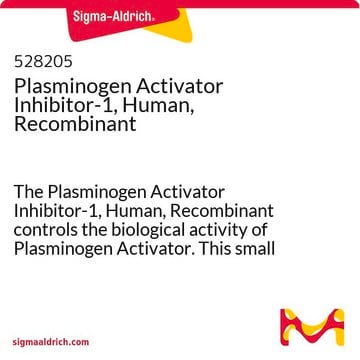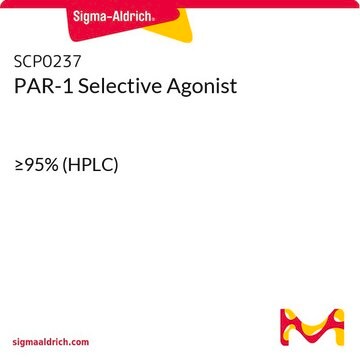A3227
Ala-Tyr-Pro-Gly-Lys-Phe-NH2 trifluoroacetate salt
≥98% (HPLC), lyophilized powder, PAR4 agonist
Synonym(s):
AYPGKF-NH2, PAR4-AP
About This Item
Recommended Products
product name
Ala-Tyr-Pro-Gly-Lys-Phe-NH2 trifluoroacetate salt, ≥98% (HPLC), lyophilized powder
Assay
≥98% (HPLC)
form
lyophilized powder
color
white
solubility
H2O: >10 mg/mL
storage temp.
−20°C
SMILES string
OC(=O)C(F)(F)F.C[C@H](N)C(=O)N[C@@H](Cc1ccc(O)cc1)C(=O)N2CCCC2C(=O)NCC(=O)N[C@@H](CCCCN)C(=O)N[C@@H](Cc3ccccc3)C(N)=O
InChI
1S/C34H48N8O7.C2HF3O2/c1-21(36)31(46)41-27(19-23-12-14-24(43)15-13-23)34(49)42-17-7-11-28(42)33(48)38-20-29(44)39-25(10-5-6-16-35)32(47)40-26(30(37)45)18-22-8-3-2-4-9-22;3-2(4,5)1(6)7/h2-4,8-9,12-15,21,25-28,43H,5-7,10-11,16-20,35-36H2,1H3,(H2,37,45)(H,38,48)(H,39,44)(H,40,47)(H,41,46);(H,6,7)/t21-,25-,26-,27-,28-;/m0./s1
InChI key
BGPJLFVICWHITH-HKJXYENISA-N
Amino Acid Sequence
General description
Application
Biochem/physiol Actions
Storage Class Code
11 - Combustible Solids
WGK
WGK 3
Flash Point(F)
Not applicable
Flash Point(C)
Not applicable
Personal Protective Equipment
Certificates of Analysis (COA)
Search for Certificates of Analysis (COA) by entering the products Lot/Batch Number. Lot and Batch Numbers can be found on a product’s label following the words ‘Lot’ or ‘Batch’.
Already Own This Product?
Find documentation for the products that you have recently purchased in the Document Library.
Our team of scientists has experience in all areas of research including Life Science, Material Science, Chemical Synthesis, Chromatography, Analytical and many others.
Contact Technical Service








